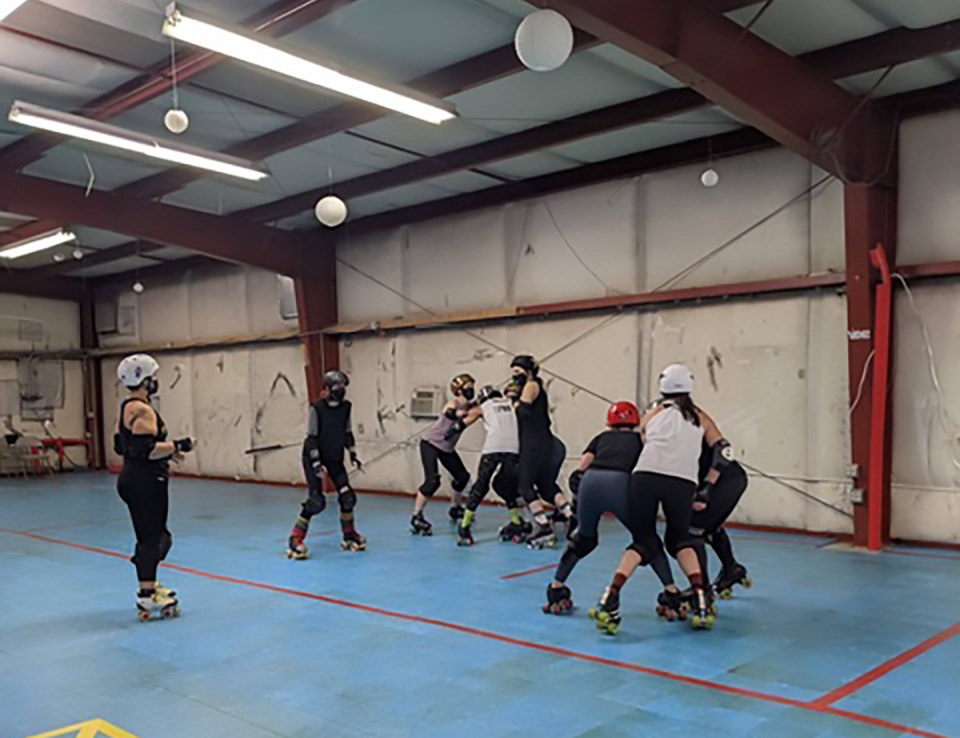Revitalizing the league is a long-running goal for the Boulder County Roller Derby, or BCRD, even before the pandemic shut down competitions and they lost their practice space, known as The Barn in 2018 due to a fire.
“Between losing our practice space when The Barn burned down and losing derby when we had the long hiatus from the pandemic, we can see how easy it is to lose this. It becomes something more precious that we don’t take for granted,” league veteran Fleur de Beast said.
During a time when diversity and equity have become priority goals across many industries, the roller derby is not immune. Typically a women’s only group, local leagues are making strides to be more inclusive and “clean up” their sport.
Roller derby is a full-contact sport played on a flat, oval, cement track, with 14-skater teams playing for two 30-minute periods. Each team fields four blockers and one jammer — the blockers try to stop or slow the rival jammers, while the jammers earn points for passing opposing blockers as they skate around the track as fast as possible.
Formerly known as the Boulder County Bombers, BCRD is in the midst of a rebranding effort for a more inclusive league, said BCRD President Bettie Rage. Gone are names like Bombers, Daisy Nukes or the Shrap Nellies — even the junior derby league is getting away from the Bottle Rockets, though a new name hasn’t been chosen yet. The league is set to change the image and improve the mission, which includes removing sexist, violent and war-like imagery, she explained.
The change is happening throughout the sport, being more inclusive of LGBTQ members, people of color and men. In 2015, Denver's Roller Dolls changed their name to Denver Roller Derby to be more inclusive for men and youth participants. Rage said BCRD is currently open to any participant who identifies as female, but discussions about inviting in male skaters are on the table.
Included in those changes are the attitudes from coaches and skaters, de Beast said. The league is moving away from aggressive, punitive training and demeaning language, she said, and more respect and compassion for each other.
“This current generation of the sport I’m currently involved in seems to really get it. This is a sport we really want people to want to play. We don’t want to drive them away by saying you must have this much in the way of iron abs or thick skin to play. Those barriers are coming down, at least in this league,” de Beast explained.
Knowing that there is a whole league of people ready to care about each other keeps her going, Rage said. In that found family, de Beast praised the wide variety of skills on offer among teammates, from handling medical emergencies to getting into her car after she locked herself out or experience with commercial real estate to find a new practice space.
“I’ve joked that a roller derby team can do anything. If you have a problem, someone in the league can solve it,” de Beast said.
The triumphant return of the flat-track derby teams took another blow after increasing COVID-19 cases and a blizzard delayed the local league’s Jan. 8 bout. Rage and her teammates tried to shovel out a hockey rink to save the bout to no avail. Four hours and one broken snowblower later, the league turned the failed snow shoveling attempt into a draft party for their new home teams instead.
“There’s nothing but dedication from our league in the process of trying to get us back to playing roller derby,” she laughed. “Derby will always prevail in some shape or form.”
BCRD returns to the track at Boulder County Fairgrounds on Feb. 12. Doors open at 5 p.m. and the whistle blows on the first bouts at 6 p.m. Tickets can be purchased ahead of time online.



